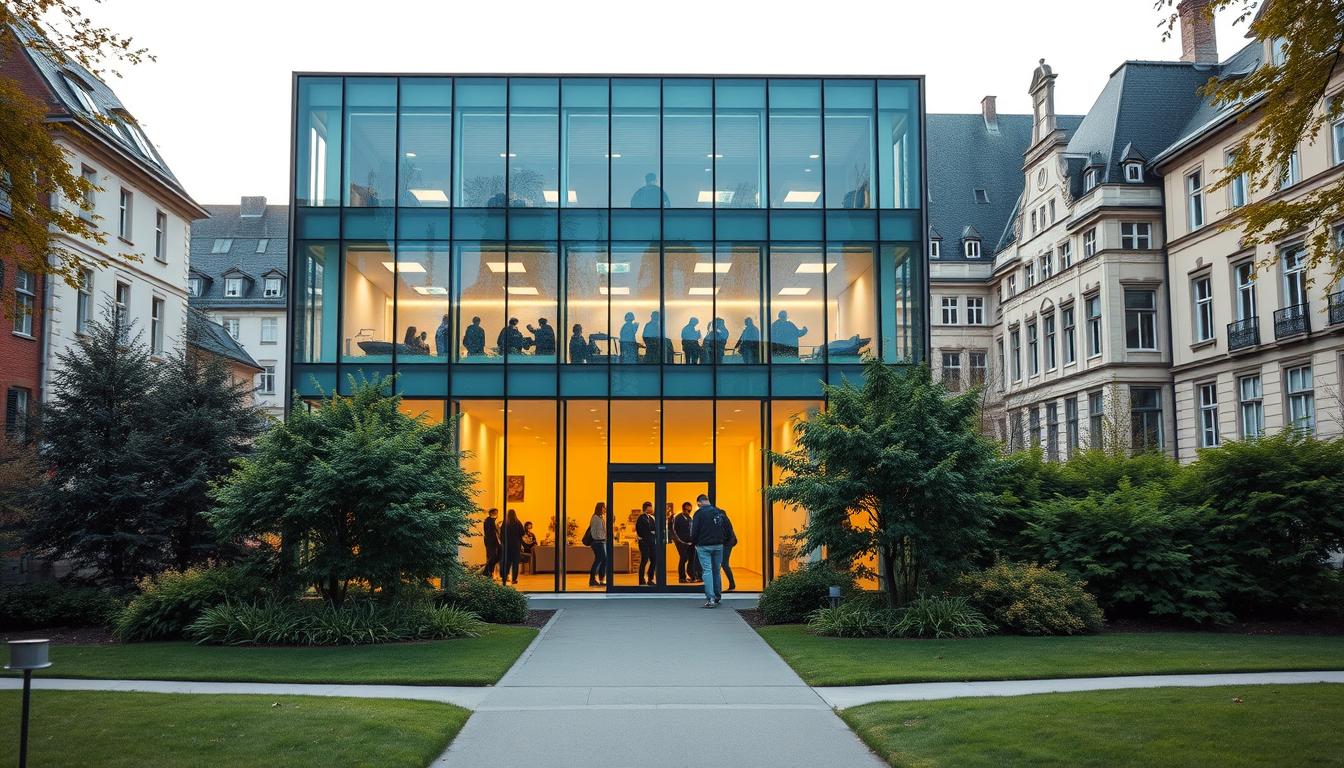Start an amazing academic journey in Europe by studying in France for the January 2025 intake. You won’t need an IELTS exam. This guide is here to help Indian students make the right choice for higher education in France.
France is known for its rich culture, advanced technology, and top universities. It’s a great chance for international students to find many opportunities. This guide will show you the different options for studying in France without IELTS.
Key Takeaways
- Explore the January 2025 intake for studying in France without IELTS
- Discover the benefits of choosing France for higher education
- Learn about alternative language requirements and top universities accepting students without IELTS
- Understand the application process, tuition fees, and cost of living in France
- Gain insights into student visa requirements, accommodation options, and cultural integration
Overview of January Intake France without IELTS
International students dreaming of studying in France have a special chance. They can start their studies in January without needing an IELTS exam. This option is becoming more popular, offering a flexible way to study in this famous European country.
Benefits of Choosing January Intake
Choosing the January intake in France has many benefits. It’s a different start time than the usual September, giving students more flexibility. Also, there’s less competition, which might help you get into your chosen school.
Alternative Language Requirements
Even without IELTS, French university admissions have other ways to check your language skills. You might need to show you’re good at French with exams like DELF or DALF. Or, you could take a language prep course.
Key Application Deadlines
- Application deadline for January 2025 intake: October 15, 2024
- Deadline for language proficiency test results: November 1, 2024
- Notification of admission decisions: December 1, 2024
Knowing the benefits, language needs, and deadlines for January intake in France helps students. It lets them make smart choices and confidently go through the French university admissions.
Why Choose France for Higher Education
France is a top European study destination with a world-class education system. It draws international student programs from all over. With its famous universities, rich culture, and wide range of courses, France is perfect for students looking for a life-changing education.
France is known for its academic excellence. It has top universities like the Sorbonne, École Polytechnique, and HEC Paris. These schools offer great research facilities, expert teachers, and a lively learning atmosphere.
France also offers a unique cultural experience for international student programs. From Paris’s beautiful streets to the French Riviera’s stunning views, there’s so much to see. Students can visit historical sites, try delicious French food, and enjoy the arts and music.
France’s location in Europe makes it great for international student programs to explore the continent. With easy travel and study visas, students can discover European culture.
“France is not only a top-tier academic destination, but also a place where you can truly immerse yourself in a vibrant, cosmopolitan culture.” – Dr. Isabelle Dupont, Dean of International Affairs, University of Bordeaux
France is a top choice for higher education. It offers world-class universities, diverse cultural experiences, and a great location. France provides a global and enriching education for students.
Top French Universities Accepting Students Without IELTS
International students looking to study in France without IELTS have many options. Reputable universities, including public and Grande Écoles, offer flexible admissions. These institutions provide a wide range of programs, making higher education in France both diverse and accessible.
Learn more about French University Admissions and Tuition-Free Education in France.
Public Universities
France’s public universities, like the Sorbonne University and Paris-Saclay University, don’t require IELTS. They offer many undergraduate and graduate programs. This makes higher education in France affordable and accessible.
Private Institutions
France also has private universities for international students. EPITA College and ESCP Business School are examples. These schools offer specialized programs and a personalized learning experience, with flexible language requirements.
Grande Écoles Options
The Grande Écoles are France’s top institutions, known for excellence. Admission is competitive, but some, like CentraleSupélec, accept international students without IELTS. They focus on other criteria.
“France’s higher education system offers a diverse range of options for international students, with many universities and institutions welcoming applicants without the IELTS requirement.”
Exploring these options, international students can find the perfect match for their goals. They’ll also experience France’s rich culture and intellectual scene.
Language Requirements and Alternatives to IELTS
For French University Admissions, international students face a big challenge. They need to show they can speak the language. While IELTS is common, French universities also accept other tests.
The Diplôme d’Études en Langue Française (DELF) and the Diplôme Approfondi de Langue Française (DALF) are two such tests. They are given by the French Ministry of Education. These exams check how well students can speak French, making them good alternatives to IELTS for Non-English Language Requirements.
The Test de Connaissance du Français (TCF) is another option. It tests how well someone can speak French. It looks at reading, writing, listening, and speaking. This makes it a complete test of French skills.
Some universities in France might have their own ways to check language skills. They might use exams or interviews. It’s important for students to check what each university needs.
| Language Test | Description | Accepted by French Universities |
|---|---|---|
| DELF/DALF | Standardized French language proficiency exams administered by the French Ministry of Education | Yes |
| TCF | Assesses an individual’s French language proficiency, including reading, writing, listening, and speaking | Yes |
| University-specific Language Assessments | In-house exams or interviews conducted by French universities to evaluate an applicant’s French language abilities | Varies by university |
By looking into these other tests, international students can find ways to meet language needs. This helps them get into the French university they want.

Available Programs and Courses for January 2025
The January 2025 intake in France has many academic programs for international students. You can find undergraduate programs, graduate degrees, and specialized courses. France’s top universities and Grande Écoles have lots to choose from.
Undergraduate Programs
Popular undergraduate programs in France include Bachelor’s degrees in Business, Engineering, Computer Science, and Liberal Arts. These programs mix theory with practical experience. They prepare students for their future careers.
Graduate Programs
France’s universities and grandes écoles offer many Master’s programs. You can study International Business, Sustainable Development, Digital Transformation, and Artificial Intelligence. These programs are for those who want to dive deep into their field.
Specialized Courses
- French Language Immersion Programs
- International Business and Entrepreneurship Certificates
- Sustainability and Environmental Studies Courses
- Cutting-Edge Technology and Innovation Workshops
These specialized courses let international students improve their French, learn about business, or explore new fields. They add to their main degree programs.
“Studying in France without IELTS opens up a world of possibilities for international students, allowing them to immerse themselves in a dynamic academic environment and gain a global perspective.”
If you’re looking at International Student Programs or want to Study in France without IELTS, the January 2025 intake has a lot to offer. Check out the wide range of programs and courses. Start your educational journey in this famous European place.
Application Process and Documentation
Applying to French universities is easy, even for Indian students wanting to Study in France without IELTS. The French University Admissions process has a few main steps. Prospective students need to know these steps.
The first step is to find the right online application platform for your university. Many French schools use systems like Parcoursup. This makes applying easier. Students should check the specific needs and deadlines for their program.
- Gather all needed application documents, like academic records, letters of recommendation, and a personal statement.
- Indian students must make sure their academic papers are authenticated and translated correctly for French universities.
- You might need to send extra stuff, like a portfolio or other language tests, besides IELTS.
After you apply, the university will check your documents. They might ask you for an interview or other tests. This chance lets you show off your skills, interest in your field, and how well you fit the program.
| Key Application Deadlines for French Universities |
|---|
| Undergraduate Programs: January 15th |
| Graduate Programs: May 1st |
| Specialized Courses: Varies by program |
By knowing the French University Admissions process and following the deadlines and document rules, Indian students can boost their chances. They can get into their top French school, even without IELTS scores.
Tuition Fees and Cost of Living
Going to school in France is a great chance for Affordable Higher Education. The country has top universities and institutes for many fields. But, it’s important to know about tuition and living costs for those looking for Tuition-Free Education in France.
University Fee Structure
Tuition fees in France change based on the school and study level. Public universities are cheaper, with fees from €150 to €700 a year for undergrads. Postgrad fees are €300 to €1,000. Private schools cost more, often over €10,000 yearly.
Monthly Living Expenses
Living costs in France also matter, changing by city and lifestyle. Monthly bills for housing, food, and more can be €700 to €1,200 in big cities like Paris and Lyon.
Financial Planning Tips
- Look up and compare fees and living costs at different schools and cities for the best Affordable Higher Education.
- Check out scholarships and financial aid to help with Tuition-Free Education in France.
- Make a budget for tuition, housing, food, and more to plan your money well.
- Think about getting a part-time job to earn extra money and cover living costs.
Knowing about tuition and living costs in France helps you plan better. This way, you can have a great and affordable education journey.
Student Visa Requirements and Process
Getting a Visa for France as an international student can seem hard. But, with the right help, it can be easy. We’ll look at what you need and how to get a French student visa. We’ll focus on what Indian students need to know.
To study in France, you need a student visa. The process starts with applying at the French Embassy or Consulate in your country. You’ll need a valid passport, proof of university acceptance, enough money, and plans to go back home after studying.
- Gather the needed documents: Passport, university acceptance letter, proof of money, and more.
- Fill out the student visa application form on the French Embassy website.
- Book an appointment at the French Embassy or Consulate to submit your application and documents.
- Go to the visa interview, where you’ll talk about your studies and plans to return to India.
- Wait for the visa to be processed, which can take weeks. Be patient, as it depends on how many applications they have.
Indian students should know the Visa Process for France has special rules. Check the latest info with the French Embassy or your university. With the right steps and care, you can get your visa and start your studies in France.

Accommodation Options in France
Planning your higher education in France means finding the right place to live. As an international student, you have many choices. From dorms to private apartments, France has something for everyone.
University Residences
Many French universities offer dorms called résidences universitaires or CROUS residences. These are affordable and comfortable for international students. Rooms are furnished, and there are shared kitchens and common areas.
It’s wise to apply for a university residence early. They are popular, and spots fill up fast.
Private Housing Options
For more freedom, private housing is available. You can rent apartments or shared flats. Résidences étudiantes, privately owned student housing, is also a good choice. They offer private rooms and common areas.
When looking for private housing, think about location and cost. Temporary housing like hotels or Airbnb can help while you find a permanent place.
Finding housing in France as an international student can be tough. But with the right research, you can find the perfect place. This ensures a smooth start to your studies in Europe.
Scholarships and Financial Aid Opportunities
Going to college in France can be cheap and easy for Indian students. There are many scholarships and financial aids to help. You can find Affordable Higher Education or Tuition-Free Education in France with these options.
The French government has many scholarship programs. The Eiffel Excellence Scholarship is one of them. It helps students with master’s and doctoral studies. Also, many public universities in France have their own scholarships for both undergrad and graduate students.
- Eiffel Excellence Scholarship: A top program that covers tuition, living costs, and travel for international students in France.
- University-Specific Scholarships: Universities like Sorbonne and Université de Bordeaux offer scholarships for international students.
There are also other funding sources for Indian students. These include private foundations, non-profit groups, and corporate sponsorships.
- Private Foundation Scholarships: Groups like the French-American Foundation and the French Ministry of Foreign Affairs give scholarships.
- Corporate Sponsorships: Some big companies in France offer scholarships or financial help to students.
With so many Affordable Higher Education and Tuition-Free Education in France choices, Indian students can get the financial help they need. This makes studying in France a real possibility.
“Education is the most powerful weapon which you can use to change the world.”
— Nelson Mandela
Part-Time Work Regulations for International Students
As an international student in France, knowing about part-time work rules is key. It helps you earn extra money and get work experience. France has many part-time job options for students, but you must follow the rules.
Work Permit Requirements
All international students in France need a work permit, called a “titre de travail,” for part-time jobs. This permit usually comes with your student visa. It lets you work up to 60% of a full-time job, which is about 964 hours a year.
Popular Job Sectors for International Students
- Retail and customer service roles
- Hospitality and catering industry
- Administrative and clerical positions
- Tutoring and language instruction
- Research and laboratory assistance
Balancing Academics and Part-Time Work
Remember, part-time work is allowed, but studying comes first. The rules on working hours help you balance school and work. This way, you can focus on your studies and work without getting overwhelmed.
| Work Permit Allowance | Maximum Working Hours per Year |
|---|---|
| 60% of a full-time position | 964 hours |
Understanding part-time work rules in France can make your study experience better. It helps you manage money and school work. Using these work options can also give you practical skills and make your education more complete.
Cultural Integration and Student Life in France
Being an international student in France is a rewarding experience. You can dive into the country’s rich culture and lively student life. There are many chances to make lasting connections and feel at home.
Campus Life
French universities have a wide range of clubs and activities. Whether you love sports, arts, or helping others, you’ll find something that interests you. Joining in helps you grow personally and makes it easier to connect with others.
Social Integration Tips
- Immerse yourself in French language and culture by attending cultural events, joining language exchange programs, or volunteering in the local community.
- Explore the vibrant culinary scene and discover the regional specialties that make French cuisine so renowned worldwide.
- Embrace the French’s love for outdoor activities and adventure by participating in hiking, cycling, or water sports in the country’s scenic landscapes.
- Engage with your fellow international and French students through shared hobbies, social gatherings, or student-led initiatives that foster cross-cultural connections.
By diving into France’s culture and student life, you’ll make your studies even more rewarding. You’ll create memories and friendships that last a lifetime.
“Studying in France has been a truly transformative experience. The rich culture, vibrant campus life, and welcoming community have broadened my horizons and enriched my personal growth in ways I never imagined.”
| Campus Activities | Social Integration Opportunities |
|---|---|
| Student clubs and organizations | Cultural events and festivals |
| Sports and recreational facilities | Language exchange programs |
| Volunteer and community service | Outdoor adventures and excursions |
| Arts and performance groups | Student-led social gatherings |
Conclusion
Starting your higher education in France for January 2025 is exciting. You can do it without IELTS, opening doors to top French universities. This chance lets Indian students explore new academic and cultural experiences.
France offers a wide range of universities, from public to private and Grande Écoles. These options meet different interests and career goals. By using other language tests, you can easily apply and dive into France’s rich education scene.
The January 2025 intake is a great time to start your education in France. You can choose from many programs, from undergrad to graduate and special courses. With the right help, you can apply, get your visa, and enjoy a life-changing experience.
Why France is a popular study destination
France is a popular destination for international students because it offers a high-quality education at an affordable price. In addition, France is a beautiful country with a rich culture and history.
There are many reasons why France is a popular study destination. First, the quality of education is excellent. French universities are highly ranked globally and offer students a chance to learn in world-class facilities. Second, tuition fees are relatively low when compared to other developed countries. This makes France an attractive option for students looking to get a good education without breaking the bank.
Finally, France is simply an amazing place to live. The country has stunning scenery, world-renowned cuisine, and some of the most famous historical landmarks in the world. From the Eiffel Tower to the Palace of Versailles, there is no shortage of things to see and do in France.
The geography of France
France is a country located in Western Europe. The country has several different geographical regions, including the mountainous Alps region in the east, the lowland plains of Northern and Eastern France, and the coastal regions of Southern France. The country is also home to several island territories, such as Corsica and Réunion.
The French Alps are a popular destination for winter sports enthusiasts from all over Europe. The region is home to several world-renowned ski resorts, such as Chamonix and Courchevel. In addition to skiing and snowboarding, the Alps are also popular for hiking, mountain climbing, and other outdoor activities.
The plains of Northern and Eastern France are some of the most fertile agricultural land in all of Europe.
France is well known for its culture, art, food, wine, and fashion. The French people are very proud of their culture and are always striving to protect it. France has been a major cultural force in Europe for centuries.
The culture: Art, Food, Wine, Fashion
The arts have always been an important part of French culture. Many famous painters, sculptors, and architects are French. The Louvre, one of the world’s most famous museums, is located in Paris. France is also home to many great writers and philosophers.
Food and wine are two other aspects of French culture that are enjoyed around the world. French cuisine is considered to be some of the best in the world. And wine-making is an important tradition in France, with many different regions producing their own unique wines.
Fashion is another area where France is internationally renowned.
History: a timeline of key events
France has a long and complex history, with many different periods and events that have shaped the country into what it is today. Here is a timeline of some of the key events in French history:
- 476: The fall of the Western Roman Empire leads to centuries of instability in France.
- 987: Hugh Capet is crowned King of France, beginning the Capetian dynasty.
- 1137: The marriage of Eleanor of Aquitaine to Louis VII triggers a series of wars between France and England.
- 1226: Louis IX is crowned King, and goes on to lead two crusades and establish the first French Parliament.
- 1328: The Treaty of Paris ends the Hundred Years War between England and France.
- 1453: The end of the Hundred Years War coincides with the start of the Wars of Religion in France.
Geography: what to see and do in different regions
There are many different regions in France, each with its own unique culture and attractions. Here are just a few of the things you can see and do in different parts of the country:
In Brittany, located in the northwest of France, you can enjoy the region’s stunning coastline, including its dramatic cliffs and sandy beaches. The capital city of Rennes is also worth a visit, with its medieval buildings and lively nightlife.
If you head to Normandy in the north of the country, you’ll find yourself in an area steeped in history. This is where you can see the famous Mont Saint-Michel Abbey, as well as many other WWII sites. The picturesque town of Rouen is also worth a visit.
Weather: when to visit for the best conditions
France is a country with many different types of weather. The best time to visit France depends on what type of weather you are looking for. If you want to experience the warm weather, the best time to visit is from June to August. This is when the temperatures are the highest and there is little rainfall. If you want to experience the cooler weather, the best time to visit is from September to November. This is when the temperatures start to drop and there is more rainfall.
The economy of France
France, the land of style and sophistication, is also the world’s fifth largest economy. In 2016, its GDP was an estimated 2.42 trillion US dollars. That’s about 30 percent of the entire European Union’s GDP.
France is known for its high standard of living. And it’s no wonder with a strong economy that supports a generous welfare system and universal healthcare. The French enjoy a healthy work-life balance with an average work week of just 39 hours.
The service sector dominates France’s economy, accounting for more than three-quarters of GDP. Tourism is a major contributor to the economy, with France being the world’s most visited country. Other important industries include financial services, agriculture, aerospace, and pharmaceuticals.
Also Read: French Student Visa Process
Studying abroad is a dream for many students who want to broaden their horizons and gain new experiences. However, the process of getting accepted into a foreign university can be daunting, especially when it comes to language requirements. One of the most common language tests required by universities is the International English Language Testing System (IELTS).
For students who want to study in France but do not want to take the IELTS, there are still options available. In this article, we will explore how to study in France without IELTS and provide helpful tips for prospective students.
France is a highly sought-after destination for international students seeking undergraduate, graduate, and doctoral degrees. The country is known for its high-quality education and academic research. This section provides information on studying in France without IELTS, including a list of universities that accept candidates without IELTS, eligibility criteria, and alternative exams accepted in France. It also offers guidance on the France study visa process for those without IELTS and provides a list of frequently asked questions. Additionally, Kadamb Overseas is a resource for those seeking to prepare for IELTS.
How to Study in France without IELTS
Many public and private universities in France offer admission without the requirement of IELTS scores. Moreover, some universities in France without IELTS also offer scholarships to international students. To begin with, students should search for universities that offer degrees in their desired field. Once shortlisted, students can check the university website’s eligibility and English test requirements. If the university is open to such applications, there will be a mention of an IELTS waiver.
Here are some of the universities in France without IELTS that accept student applications:
- University of Paris
- University of Bordeaux
- University of Lille
- University of Strasbourg
Students can also consider taking French language courses to improve their chances of admission. Overall, studying in France without IELTS is possible, and students can explore various options to pursue their education in France.
List of Top Universities Accepting Candidates Without IELTS
Here is a list of some of the top-ranked universities in France that offer master’s programs without requiring IELTS:
| University | Program Offered |
|---|---|
| American Business School, Paris | Master in International Business |
| EBS Paris | Master in Management |
| EPITA Graduate School of Computer Science | Master in Computer Science |
| ESAIP School of Engineers | Master in Engineering |
| ESC Rennes School of Business, France | Master in Management |
| ESGCI, Paris | Master in Marketing |
| Paris School of Business | Master in International Business |
| IESA International | Master in Arts and Culture Management |
| INSEEC Business School | Master in Business Administration |
| ISC Paris | Master in Management |
| NEOMA Business School | Master in Management |
| Paris School of Business | Master in Data Management |
| SKEMA Business School | Master in Management |
| Toulouse Business School | Master in Management |
These universities offer a range of programs in various fields such as business, engineering, computer science, and arts and culture management. Candidates who are interested in pursuing a master’s degree in France but do not wish to take the IELTS exam can consider applying to these universities.
France Without IELTS Study Visa Process
France is a popular destination for international students seeking higher education. Students from some countries may need to obtain a student visa, while others may not. It is recommended that students contact their consulate or embassy in their home country to determine if a study visa is required and the specific application process.
For those who do not require an IELTS score, studying in France can be a great opportunity. However, it is important to note that some universities may still require proof of language proficiency, so it is best to check with the university beforehand.
Overall, the process for obtaining a study visa in France can vary depending on the student’s nationality and the length of their stay. It is important to research and carefully follow the application process to ensure a smooth and successful study abroad experience in France.
France Study Visa IELTS Requirements
To obtain a France study visa, an IELTS exam is not always required, unless the university you are applying to specifically requests it. In some cases, an alternative internationally recognized exam may be accepted. Additionally, it is important to note that you must apply for a study visa only after obtaining an admission letter from the university and a clearance letter.
Eligibility Criteria to Study in France Without IELTS
French universities offer various alternatives to IELTS for students who want to study in France. Apart from the English language proficiency test requirements, the rest of the eligibility criteria remain constant. Some of the alternatives that universities offer include:
- Taking a university interview to check the student’s English-speaking skills
- Having studied or done a Bachelor’s degree from an English language institution
- Having exceptional academic scores on behalf of the English language tests
- Taking an alternative exam equivalent to IELTS
These alternatives are available for students who want to apply to universities like Rennes, Epita, INSEEC, College De Paris, and others. It is important to note that each university may have its own set of eligibility criteria, and it is advisable to check with the university before applying.
Exams Accepted in France Apart from IELTS
Apart from IELTS, popular English language proficiency tests accepted by universities in France include TOEFL, TOEFC, C1 Academic, and PTE Academic.
Prepare for IELTS With Kadamb Overseas
If you are struggling to prepare for the IELTS exam on your own, Kadamb Overseas’s booster program can help. This six-week-long course starting from ₹15,000 and is 100% refundable if students choose to start their study abroad journey with Kadamb Overseas.
The program offers 25 hours of live online classes, four one-to-one doubt clearing sessions, four one-to-one speaking practice sessions, 15 writing assignments with correction and feedback, two full-length mock tests, and one-to-one analysis of two full-length mock tests.
With Kadamb Overseas’s booster program, students can receive academic writing assistance, profile building guidance, university application support, education loan advice, and visa assistance. This comprehensive program ensures that students are fully prepared for all aspects of their study abroad journey.
FAQ
What are the benefits of choosing the January intake for studying in France?
Choosing the January intake in France has many perks. You get more flexibility in applying and start your studies early. Plus, you might face less competition for spots than in September.
What are the alternative language requirements to IELTS for studying in France?
French universities accept tests like DELF, DALF, and TCF instead of IELTS. Some schools also offer their own language tests or prep programs for international students.
What are the key application deadlines for the January 2025 intake in France?
The January 2025 intake in France has deadlines from September to November 2024. Always check the exact dates for your university or program, as they can change.
Why should I choose France for higher education?
France is a top choice for higher education. It offers world-class universities, a rich culture, and diverse programs. It’s a favorite among international students.
What are some of the top French universities that accept students without IELTS for the January 2025 intake?
Many top universities in France accept students without IELTS for January 2025. This includes the University of Paris, Sorbonne University, and prestigious schools like HEC Paris and École Polytechnique.
What alternative language proficiency tests are accepted by French universities in place of IELTS?
French universities accept DELF, DALF, and TCF tests instead of IELTS. These tests check your French skills and are recognized by French schools.
What types of programs and courses are available for international students in the January 2025 intake?
For January 2025, French universities offer many programs. You can study business, engineering, humanities, and sciences. There are undergraduate, graduate, and specialized courses.
What is the application process and required documentation for studying in France without IELTS?
To apply to French universities without IELTS, you need to submit an online form. You’ll also need to provide your academic records, language test results, and other documents. Each university has its own requirements, so check theirs carefully.
What are the tuition fees and living expenses for studying in France?
Tuition fees in France vary by university type. Public universities are often cheaper, while private ones cost more. Living expenses, like rent and food, also vary by city and lifestyle.
What are the student visa requirements and application process for studying in France?
To study in France, you’ll need a student visa. This involves applying, providing documents, and meeting certain criteria. The application and processing times can vary, so start early.
What accommodation options are available for international students in France?
International students in France have many housing options. You can live in university residences, CROUS residences, or private apartments. Costs and availability depend on the university and location.
What scholarships and financial aid opportunities are available for Indian students studying in France?
Indian students can find scholarships and financial aid for studying in France. Look for government programs, university scholarships, and external funding. Apply for these opportunities early to increase your chances.
What are the regulations and opportunities for part-time work while studying in France?
International students in France can work part-time, up to 964 hours a year. You’ll need a work permit and must follow French work laws.
How can I integrate into the cultural and student life in France?
To fit in with French culture and student life, join campus activities and student groups. Practice French and get involved in your community. Making friends with both French and international students helps with cultural adaptation.





